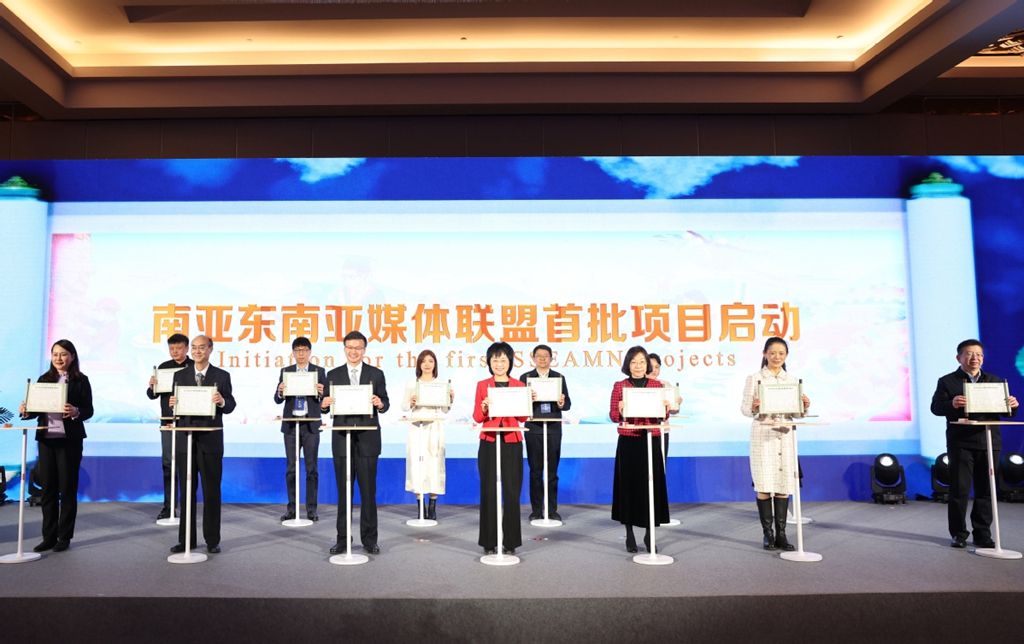Media network to promote regional ties

Guests attend the launch ceremony of the first 21 projects of the South and Southeast Asian Media Network in Beijing on Wednesday. The network was founded on the same day. FENG YONGBIN / CHINA DAILY
Media: Network members to facilitate cultural exchanges
The South and Southeast Asian Media Network was founded on Wednesday in Beijing, highlighting the role of media in deepening cooperation and promoting regional socioeconomic development.
China Daily Asia Pacific and the Yunnan International Communication Center for South and Southeast Asia lead the establishment of the network, and have invited media organizations, reporters' associations and news agencies from countries in or related to South and Southeast Asia to join.
Qu Yingpu, publisher and editor-in-chief of China Daily, said the founding of the network has received active responses from mainstream media in South and Southeast Asia, and is expected to set a new model for media cooperation in Asia.
"China and countries of South and Southeast Asia are linked by mountains and rivers, and our cultures are connected. … In the past century, when we supported and collaborated with each other for national liberation and economic development, we built a stronger bond," he said.
When China Daily reporters conducted interviews in these countries, they were deeply impressed by the people-to-people exchanges, Qu said, adding that the vivid details depicted in their stories are testimony to the long-lasting friendship between China and South and Southeast Asian countries.
Zeng Yan, head of the publicity department of the Yunnan Provincial Committee of the Communist Party of China, said that in China's communication with South and Southeast Asian countries, Yunnan has played a big role.
"Yunnan is a major gateway for China to open up to South and Southeast Asia, and the Indian Ocean rim region. It shares geographical proximity, cultural affinity, and close people-to-people connections and business interactions with these countries," Zeng said.
She said the establishment of the network is aimed at building a platform and mechanism through which media organizations in different countries can communicate and cooperate.
Members of the network will collaborate on publishing newspapers and magazines, and managing websites and new media platforms. They will share resources, help promote technological innovation and facilitate cultural exchanges, Zeng added.
Qu said that taking the establishment of the network as a new start, China Daily hopes to deepen communication with media organizations in Yunnan and other network members, and contribute the power of media to building a community with a shared future for mankind.
He also emphasized the tremendous potential for economic cooperation between China and South and Southeast Asian countries.
"We hope members of the network will provide information and build platforms for multilateral economic and trade cooperation, better promote economic development, and drive the process of regional integration," he said.
Zeng said that more than 40 overseas and 50 domestic media organizations have either joined the network or expressed their willingness to join.
Vansay Tavinyan, editor-in-chief of Pasaxon, a newspaper in Laos, said in a video clip that he believes the network will play an important role in facilitating the communication and cooperation between China and South and Southeast Asian countries.
The first group of 21 projects of the network were initiated at the ceremony. These include China's media cooperation with Thailand, Cambodia, Laos and Nepal on news promotion, video production, cultural and creative products development, and tourism promotion this year.
For example, an activity on following in the footsteps of famous Chinese mariner Zheng He, who led seven expeditions to southeastern, southern and western Asia, and even East Africa during the Ming Dynasty (1368-1644), was introduced during the ceremony.
Reporters from the Yunnan International Communication Center for South and Southeast Asia said they will make short videos about their travels from Yunnan to Thailand, Malaysia, Sri Lanka and other countries, during which they will seek to trace Zheng's footprints through interactions with the locals.








